2020 年天津商业大学翻译硕士英语考研真题
I. Choose the one answer that that best explains the underlined word or phrase in
the sentence. Write your answers on the ANSWER SHEET (20 points).
1. With mutually cherished memories, pure love, and an unyielding promise. I promise
in my own name to take on all her love, hope and grief forever and forever.
A. desired B. planned C. anticipated D. envisaged
2. Outraged netizens disseminated photos of the incident, forcing Mr. Phuc to
apologize- a rare step for a senior official in Vietnam’s authoritarian regime.
A. scattered B. dissolved C. pestered D. prowled
3. Profoundly troubling signs from human activities, including but not limited to
growing livestock
populations, global tree cover loss and higher carbon dioxide and other greenhouse
gas emissions.
A. effluent B. discharge C. preservation D. reservation
4. With its decision on Oct 15 to not ban Huawei from building its 5G network, the
German government has shown admirable courage and independence under mounting
pressure and intimidation from the United States administration.
A. humiliation B. violation C. threat D. danger
5. They may be right on some indicators, but by hoping that the private sector would
help alleviate the climate crisis, they are at best being naïve, and at worst
reflecting their helplessness.
A. increase B. mitigate C. proceed D. stimulate
6. In ancient times, the Chinese people took the Start of Winter to be the beginning
of the winter. In fact,the Start of Winter in not the beginning of winter in terms
of meteorology. The climate every year is different, so the beginning of winter could
be quite different. And with the vast territory of China, winterin every area doesn’
t begin at the same time.
�
A. biology B. aerography C. geology D. astrology
7. Financial consultants acknowledge that the value of common stock is inherently
changeable.
A. relatively B. intrinsically C. consequently D. accordingly
8. Titled “Colorful Maritime Silk Road and Mutual Learning Among Civilizations”,
the six-day event willfeature cultural performances, forums on artistic development
and exhibitions of international intangible cultural heritages related to the
Maritimes Silk Road.
A. changeable B. untouchable C. valuable D. variable
9. Estimates are that Tianjin’s Binhai new area will by 2020 have seen the relocation
there of over 1,200 corporate headquarters, financial institutions and high-end
industries with an investment worth 400 billion yuan.
A. reinforcement B. re-position C. re-accommodation D. reformation
10. The first Morin Khuur festival concluded on Sept 8 at Inner Mongolia Arts
University in Hohhot, Inner Mongolia autonomous region. Around 50 Chinese and
international experts and scholars participated inforums at the event to discuss
the development of the Morin Khuur and related events.
A. attended B. debated C. discussed D. cooperated
11. The company is outright denying its reported hesitation to investigate Russian
interference on its platform during the 2016 presidential election, but several
other allegations from the story have been explained by the company in a way that
suggests they’re at least partially true.
A. interruption B. disturbance C. annoyance D. influence
12. A group of South African sailors near the South Pole have had an adorable
interaction with a beluga whale, playing fetch with the apparently wild animal as
though it were an oversized, wet puppy.
A. dangerous B. safe C. endearing D. admirable
13. YouTube may terminate your access, or your Google account’s access to all or
part of the Service if YouTube believes, in its sole discretion, that provision of
the Service to you is no longer commercially viable.
�
A. valuable B. acceptable C. available D. beneficial
14. After a day filled with meetings at the United Nations General Assembly,Trump
talked to reporters for over an hour, facing questions on everything from trade
policy to his embattled Supreme Court nominee Brett Kavanaugh. His answers were
rambling and at times incoherent, and even for those accustom to his unusual
rhetorical style, this was a wild ride.
A. agitating B. troublesome C. chaotic D. annoying
15. Trump didn’t offer much in the way of concrete answers in response to several
questions about the multiple sexual assault allegations against Brett Kavanaugh,
except to claim it was a “big fat con job” by the Democrats.
A. crime B. hurt C. attack D. offend
16. The policy incurred queries from the public. Many said that establishing a link
between employment rate and college courses is reasonable because colleges have the
responsibility to provide useful human resources to promote social development, but
deciding a major’s fate based solely on that rate, however, in not.
A. caused B. demanded C. eliminated D. associated
17. President Obama, who purportedly grew up around different languages and cultures,
understands and
supports these efforts.
A. allegedly B. sluggishly C. subjectively D. purposefully
18. The organizers also prepared thematic interactive platforms and photo zones,
showing military
chronicles and domestic films about the war throughout the day.
A. programs B. actions C. annals D. affairs
19. According to Bianca Nijhof, managing director of the Netherlands Water
Partnership, the network of Dutch organizations in the water sector is a first point
of call for anyone seeking Dutch water expertise, do it was no coincidence that this
invention and development t started in the Netherlands.
A. specialist B. equipment C. special knowledge D. skillfulness
�
20. There’s nothing flashy about this habit, but it works for him. “I’m not a
morning person, so I need my time with my paper and tea to wake up and kind of get
going,” Christina told Swinburne.
A. gaudy B. fiscal C. manic D. piddling
II. In each of the following sentences, there are four underlined parts, marked
with A, B, C and D. Identify and correct the part that is grammatically incorrect.
Write your answers on the ANSWER SHEET (10 points)
III. Reading Comprehension. TWO SECTIONS are included in this part. Section A
consists of some multiple-choice questions and Section B consists of some
short-answer questions (40 points). SECTION A MULTIPLE-CHOICE QUESTIONS
�
In this section there are 4 passages followed by 17 multiple-choice questions. For
each question, there are four suggested answers marked A, B, C and D. Choose the
one that you think is the best answer. Write your answers on the ANSWER SHEET.
Passage 1
Being a problem is a strange experience, —peculiar even for one who has never been
anything else, save perhaps in babyhood and in Europe. It is in the early days of
rollicking boyhood that the revelation first bursts upon one, all in a day, as it
were. I remember well when the shadow swept across me. I was a little thing,
away up in the hills of New England, where the dark Housatonic winds between Hoosac
and Taghkanic to he sea. In a wee wooden schoolhouse, something put it into the boys’
and girls’ heads to buy gorgeous visiting-cards—ten cents a package—and exchange.
The exchange was merry, till one girl, a tall newcomer, refused my card, —refused
it peremptorily, with a glance. Then it dawned upon me with a certain suddenness
that I was different from the others; or like, mayhap, in heart and life and longing,
but shut out from their world by a vast veil. I had thereafter no desire to tear
down the veil, to creep through; I held all beyond it in common contempt, and lived
above it in a region of blue sky and great wandering shadows. That sky was bluest
when I could beat my mates at examination-time, or beat them at a foot-race, or even
beat their stringy
heads. Alas, with the years all this fine contempt began to fade; for the words I
longed for, and all their dazzling opportunities, were theirs, not mine. But they
should not keep these prizes, I said; some, all, I would wrest from them. Just how
I would do it I could never decide: by reading law, by healing the sick, by telling
the wonderful tales that swam in my head, —some way. With other black boys the strife
was not so fiercely sunny: their youth shrunk into tasteless sycophancy, or into
silent hatred of the pale world about them and mocking distrust of everything white;
or wasted itself in a bitter cry, Why did God make me an outcast and a stranger in
mine own house? The shades of the prison-house closed round about us all: walls strait
�
and stubborn to the whitest, but relentlessly narrow, tall, and unscalable to sons
of night who must plod darkly
on in resignation, or beat unavailing palms against the stone, or steadily, half
hopelessly, watch the streak of blue above.
After the Egyptian and Indian, the Greek and Roman, the Teuton and Mongolian, the
Negro is a sort of seventh son, born with a veil, and gifted with second-sight in
this American world, —a world which yields him no true self-consciousness, but only
lets him see himself through the revelation of the other world. It is a peculiar
sensation, this double-consciousness, this sense of always looking at one’s self
through the eyes of others, of measuring one’s soul by the tape of a world that
looks on in amused contempt and pity. One ever feels his twoness, — an American,
a Negro; two souls, two thoughts, two unreconciled strivings; two warring ideals
in the dark body, whose dogged strength alone keeps it from being torn asunder. The
history of the American Negro is the history of this strife, —this longing to attain
self-conscious manhood, to merge his double self into a better and truer self. In
this merging he wishes neither of the older selves to be lost. He would not Africanize
America, for America has too much to teach the world and Africa.
He would not bleach his Negro soul in a flood of white Americanism, for he knows
that Negro blood has a
message for the world. He simply wishes to make it possible for a man to be both
a Negro and an American, without being cursed and spit upon by his fellows, without
having the doors of Opportunity closed roughly in his face.
This, then, is the end of striving: to be a co-worker in the kingdom of culture,
to escape both death and isolation, to husband and use his best powers and his latent
genius.
1. The underlined world “revelation” refers to ___.
A. the author’s realization that despite their different skin color whites and blacks
are fundamentally the same
B. the author’s realization that blacks are not part of the white people’s world
C. the author’ learning that not everyone is kind
�
D. the author’s realization that he could beat his white classmates at examinations
and in a foot-race
2. From his experience with the visiting-cards that narrator learns that ___.
B. white people accept all blacks except him
C. he is fundamentally the same as white people but separated from them by their
attitudes toward
blacks
D. white boys but not white girls accept him
3. The underlined word “end” in the last paragraph most nearly means ___.
A. conclusion
B. closing stages
C. result
D. goal
4. The most appropriate title of this passage would be ___.
A. Blacks Can Never Be Fully American
B. Blacks Must Give Up Their Heritage to Be Truly American
C. The Problem of Black Identity in America
D. The Black Experience in America
Passage 2
The first professional higher educators in the Western world were the group brilliant
talkers and keen thinkers who appeared in Greece during the fifth century B.C. They
were called “sophists.”
They were exclusively lecturers. All that we hear of them shows them as phenomenally
graceful and subtle talkers, usually to fairly large audiences. In that they are
the direct ancestors of the modern “authority” who tours the large cities giving
a carefully prepared speech in which his own personal power or charm is combined
with well-spaced jokes and memorable epigrams, the whole varying very little from
one repetition to another. Like him, they were highly paid and widely advertised
and welcomed by a reception committee and entertained by ambitious hosts. But unlike
him, some of them professed to be authorities on everything.
�
They said they could lecture on any subject under the sun. Often they were challenged
to speak on odd and difficult topics, and accepted the dare. However, they did not
pretend to know more facts than others, but rather to be able to think and talk better.
In that, perhaps, they are the ancestors of the modern journalists who have the knack
of turning out a bright and interesting article on any new subject, without using
special or expert information. The sophists dazzled everyone without convincing
anyone of anything positive. They
argued unsystematically and unfairly, but painted over the gaps in their reasoning
with glossy rhetoric. They had few constructive ideas, and won most applause by
taking traditional notions and showing they were based on convention rather than
logic. They demonstrated that almost anything could be proved by a fast talker
—sometimes they made a powerful speech on one side of a question in the morning,
and an equally powerful speech on the opposite side in the afternoon.
To some of his contemporaries Socrates looked like a sophist. But he distrusted and
opposed the
sophists wherever possible. They made carefully prepared continuous speeches; he
only asked questions. They took rich fees for their teaching; he refused regular
payment, living and dying poor. They were elegantly dressed, with secretaries and
servants. Socrates wore the workingman’s clothes, and bare feet. They spoke in
specially prepared lecture-halls; he talked to people at street-corners and in the
gymnasium, where every afternoon the young men exercised, and old men talked.
Socrates said he trained people to think. The sophists said they knew everything
and were ready to explain it. Socrates said he knew nothing and was trying to findout.
The sophists were the first lecturers. Socrates was the first tutor. His invention
was more radical than theirs. Speeches such as they delivered could be heard
elsewhere—in the new democratic law-courts, where clever orators tried to sway
large juries by dozens of newly developed oratorical tricks, and in the theatres,
where tragic kings, queens, gods, and heroes accused and defied one another in long
speeches, and in the assemblies of the people, where any citizen could speak on the
destinies of Athens. And traveling virtuosi like the sophists were fairly common
�
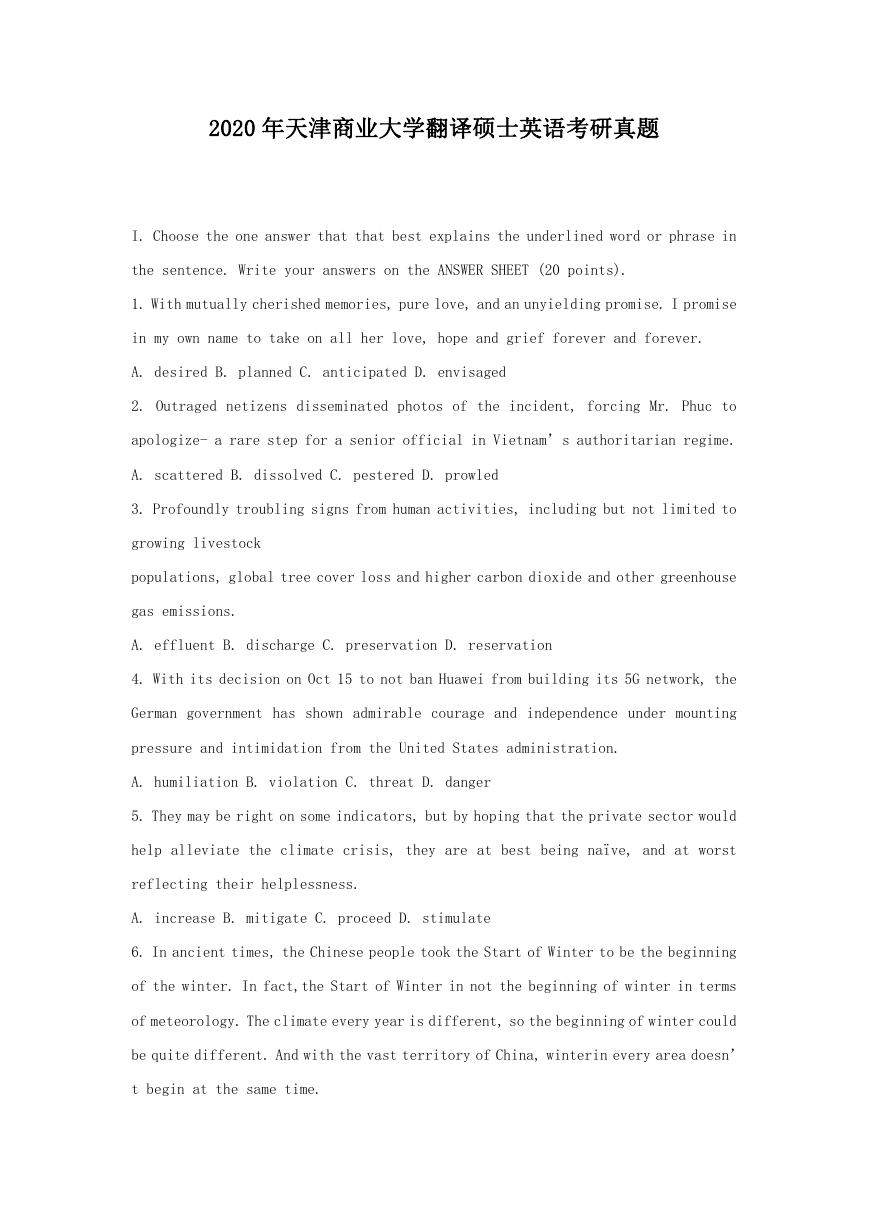
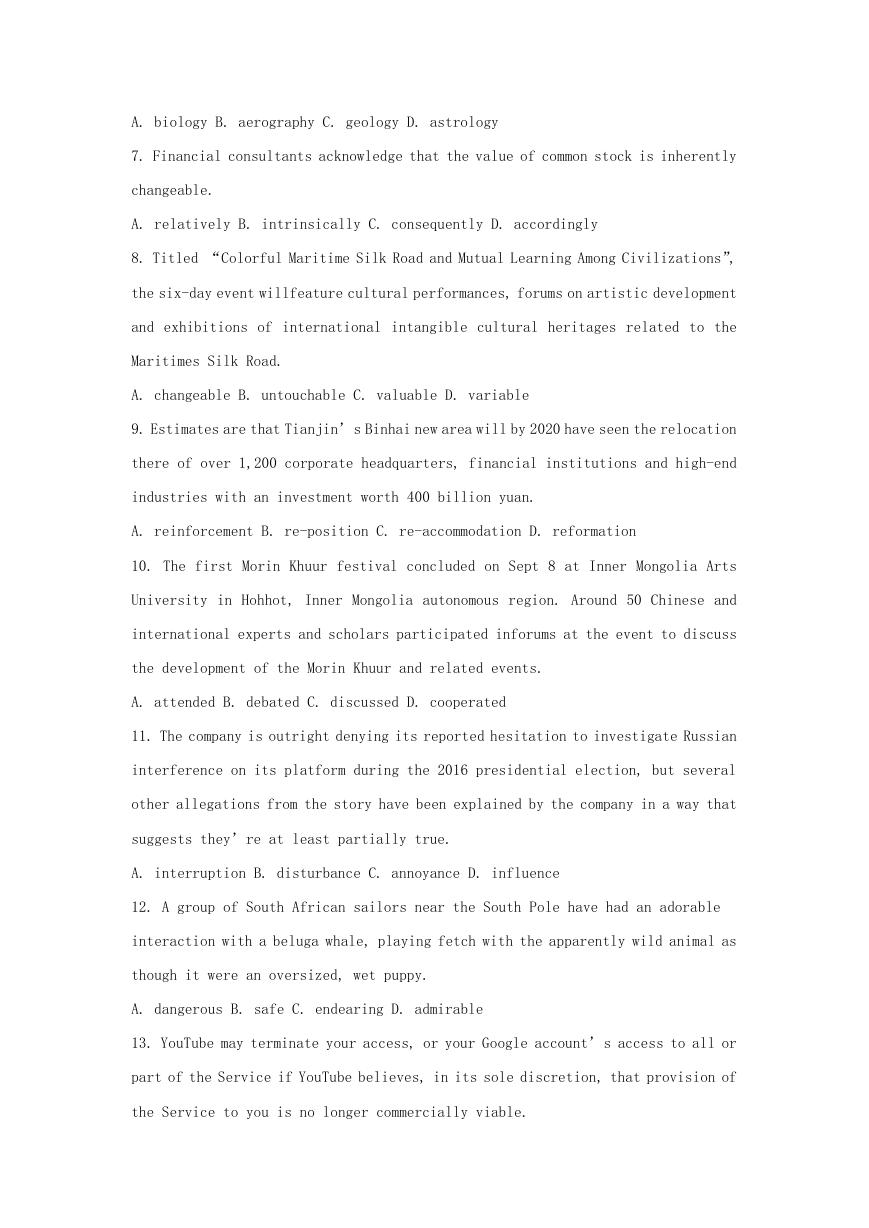
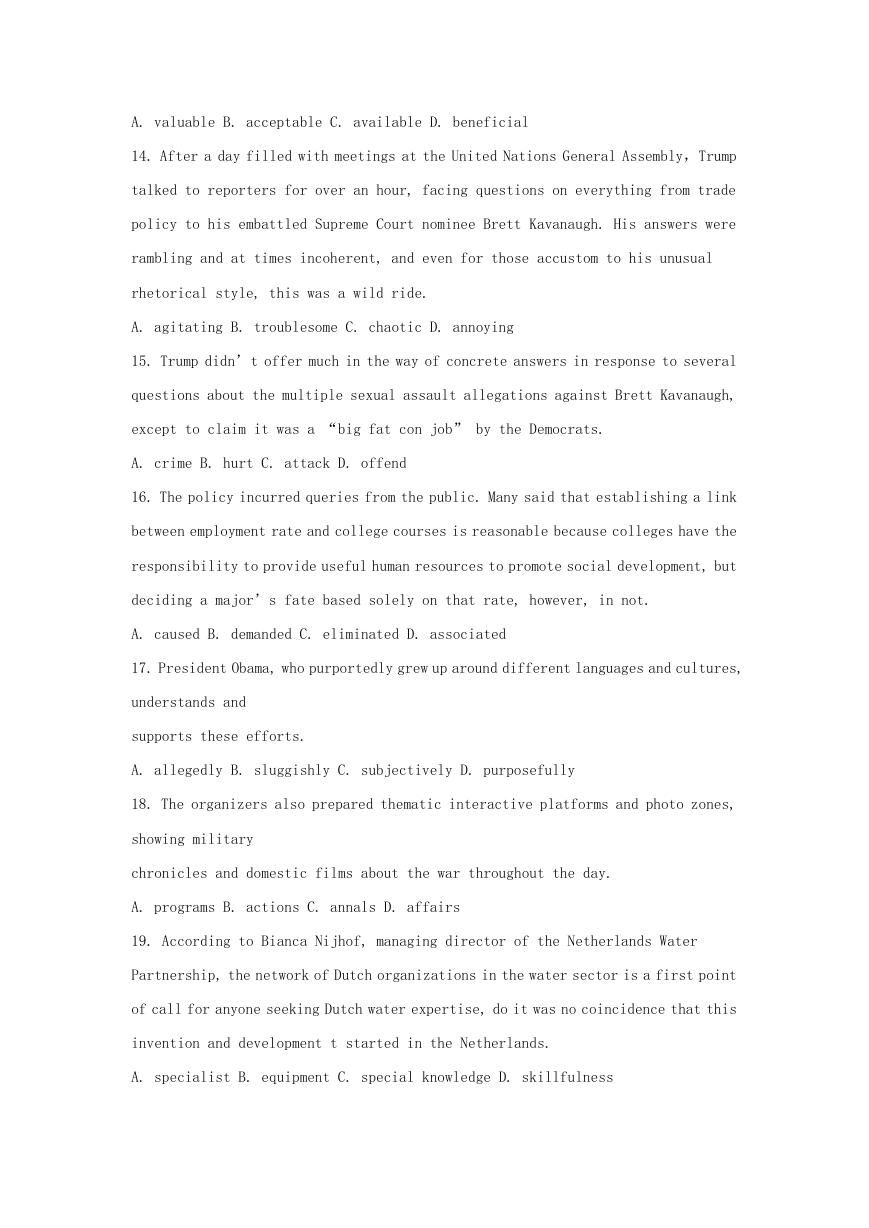
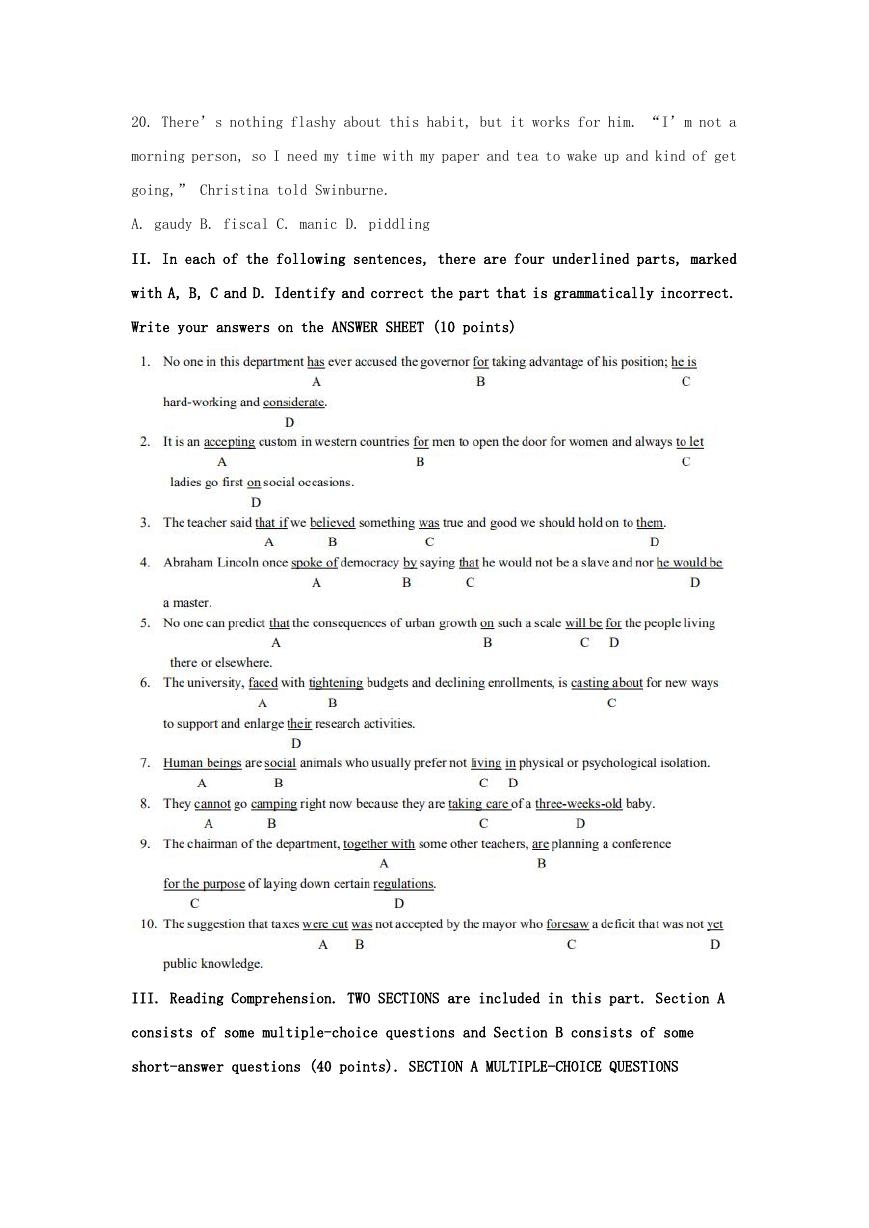

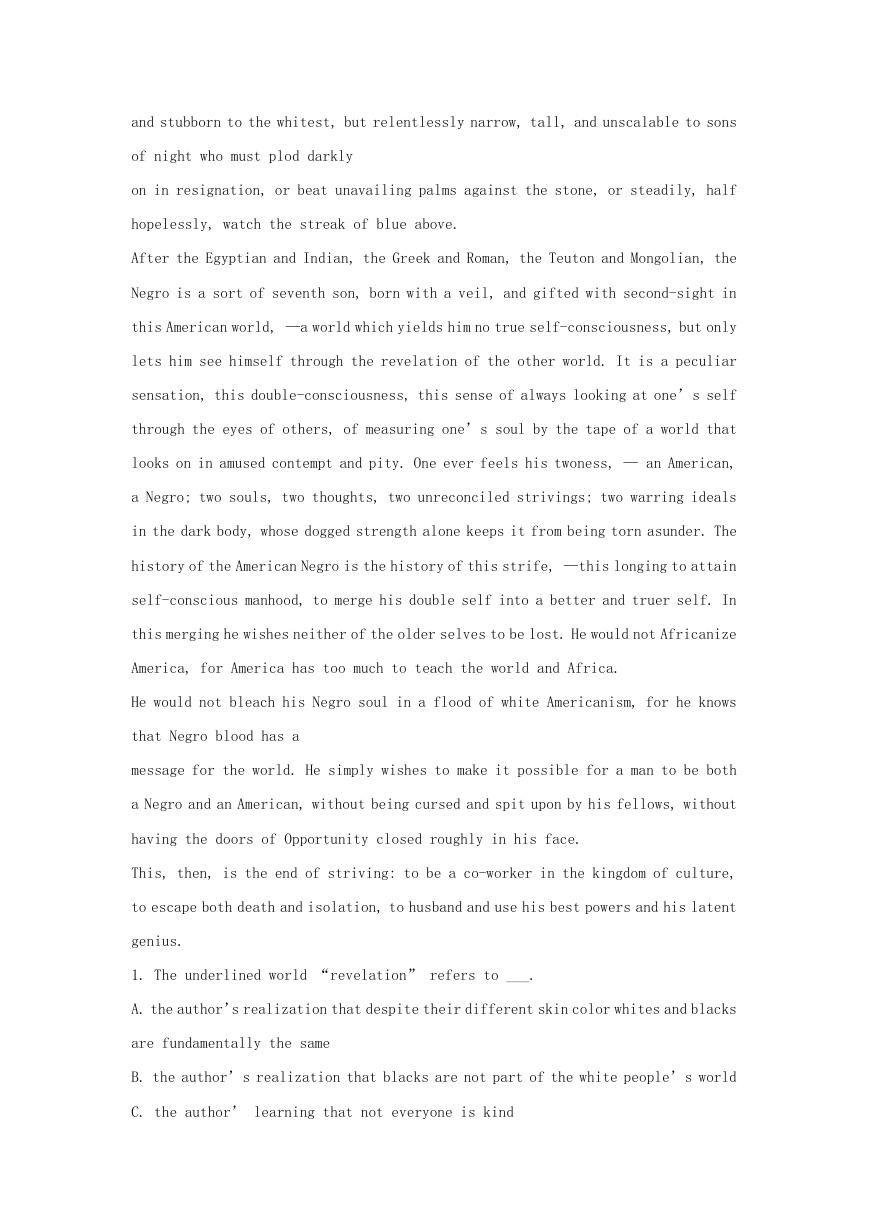

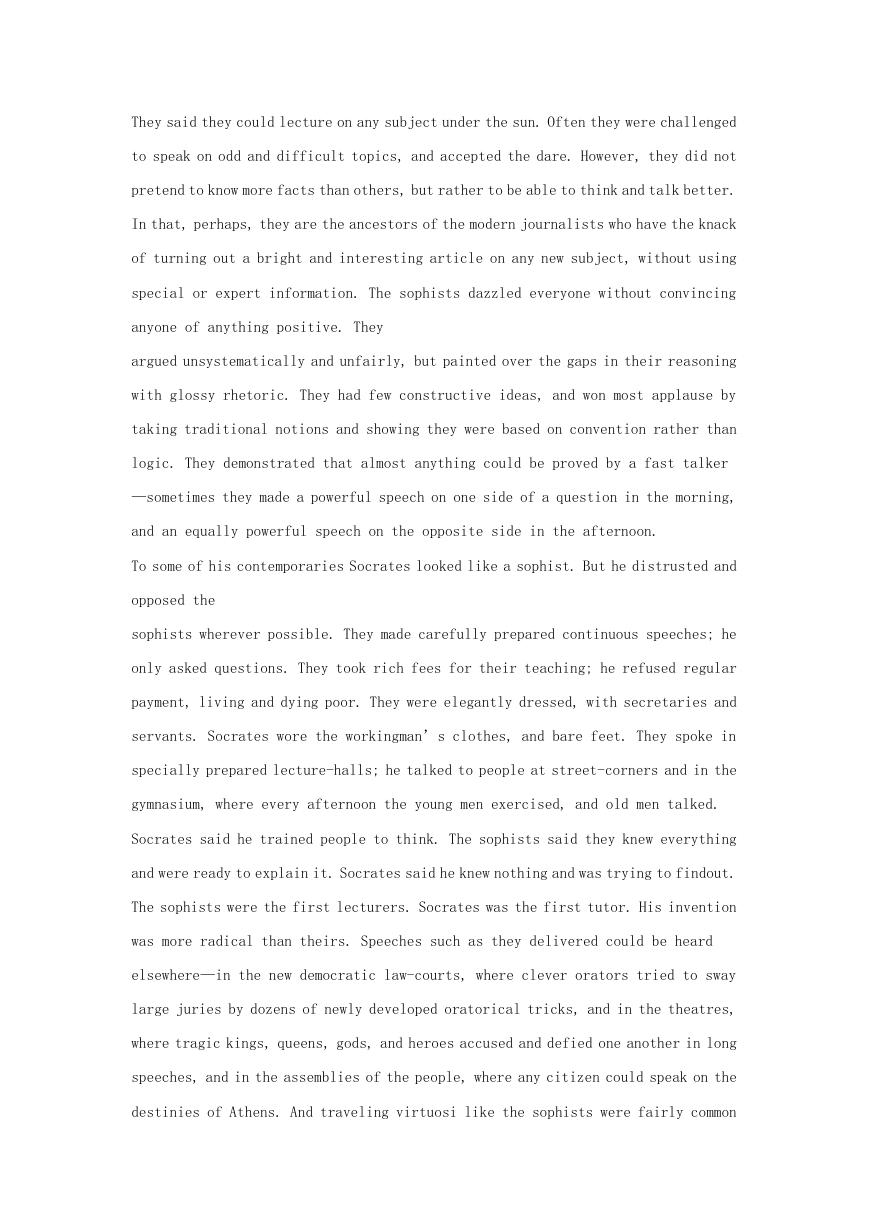








 2023年江西萍乡中考道德与法治真题及答案.doc
2023年江西萍乡中考道德与法治真题及答案.doc 2012年重庆南川中考生物真题及答案.doc
2012年重庆南川中考生物真题及答案.doc 2013年江西师范大学地理学综合及文艺理论基础考研真题.doc
2013年江西师范大学地理学综合及文艺理论基础考研真题.doc 2020年四川甘孜小升初语文真题及答案I卷.doc
2020年四川甘孜小升初语文真题及答案I卷.doc 2020年注册岩土工程师专业基础考试真题及答案.doc
2020年注册岩土工程师专业基础考试真题及答案.doc 2023-2024学年福建省厦门市九年级上学期数学月考试题及答案.doc
2023-2024学年福建省厦门市九年级上学期数学月考试题及答案.doc 2021-2022学年辽宁省沈阳市大东区九年级上学期语文期末试题及答案.doc
2021-2022学年辽宁省沈阳市大东区九年级上学期语文期末试题及答案.doc 2022-2023学年北京东城区初三第一学期物理期末试卷及答案.doc
2022-2023学年北京东城区初三第一学期物理期末试卷及答案.doc 2018上半年江西教师资格初中地理学科知识与教学能力真题及答案.doc
2018上半年江西教师资格初中地理学科知识与教学能力真题及答案.doc 2012年河北国家公务员申论考试真题及答案-省级.doc
2012年河北国家公务员申论考试真题及答案-省级.doc 2020-2021学年江苏省扬州市江都区邵樊片九年级上学期数学第一次质量检测试题及答案.doc
2020-2021学年江苏省扬州市江都区邵樊片九年级上学期数学第一次质量检测试题及答案.doc 2022下半年黑龙江教师资格证中学综合素质真题及答案.doc
2022下半年黑龙江教师资格证中学综合素质真题及答案.doc